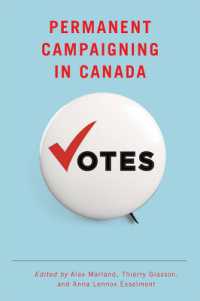Full Description
This book provides the first in-depth examination of philosophy and feminism in the works of Wittgenstein, exploring the diverse approaches within this emerging field
The four thematic parts are accompanied by an introduction from the editors. They cover the history of ordinary language philosophy, moral and political thought, feminist epistemology and conceptual approaches to gender. Chapters are written by feminist philosophers who question the way in which ordinary language philosophy can enrich moral thought. Authoritative and comprehensive, it increases the visibility of a significant field outside of mainstream philosophy and confirms the continuing impact of Wittgenstein.
Contents
INTRODUCTION
1. General introduction
2. What is Ordinary Language Philosophy?
2.1 Ludwig Wittgenstein, John L. Austin and Stanley Cavell
2.2 The Oxford Quartet
3. Main contents of the book
4. By Way of Conclusion
References
List of abbreviations for Wittgenstein's Works
CHAPTERS
Part 1. The Oxford Quartet: Wittgenstein's Philosophical Heirs and Critics
1.1 A Murdochian-Wittgensteinian Philosophical Method for Ethics (Camille Braune & Miranda Boldrini)
1.2 Anscombe, Foot and Wittgenstein: Aristotelian Necessities and Forms of Life (Valérie Aucouturier)
1.3 'Wittgenstein, oh dear me, well he was an ego wasn't he, and he was always right': Midgley on Wittgenstein (Ellie Robson)
1.4 Disrupting the Game: Ordinary Language and Situated Action (Saleta de Salvador Agra)
Part 2. Rethinking Moral and Political Emancipation with Ordinary Language Philosophy
2.1 Wittgenstein, Austin, Cavell: Some Roots of a Feminist OLP (Sandra Laugier)
2.2 The Female Voice and the Movement of Thought (Veena Das)
2.3 Feminism and Forms of Life (Nora Hämäläinen)
2.4 Agency and the Arrogation of Voice: Stanley Cavell's Wittgensteinian Feminism (Sarah Drews Lucas)
Part 3. Renewal of Feminist Epistemology from a Wittgensteinian Perspective
3.1 Rule-Following and Rule-Changing: A Feminist-Wittgensteinian Take on Language and Liberation (Anna Boncompagni)
3.2 Acts of Imagination: Women Talking and Wittgenstein on Understanding the New (Camila Lobo)
3.3 Seeing Aspects and the Sexed Body (Linda M. G. Zerilli)
Part 4. Conceptual Approaches to Gender after Wittgenstein
4.1 The Woman Question and Gender Self-Identification (Danièle Moyal-Sharrock & Constantine Sandis)
4.2 Conceptual Discontents: A Critical Inquiry into the Relationship between Wittgenstein's Ordinary Language Philosophy and Feminist Conceptual Engineering (Jasmin Trächtler)
4.3 Wittgenstein and Butler on Nonbinarism (Isabel G. Gamero Cabrera)








